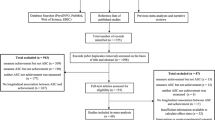Abstract
The present study used meta-analytic methodology to synthesize research on the relationship between college grades and adult achievement. The data for the meta-analysis came from 108 studies correlating grade average in college to various criteria of adult achievement or success. The average correlation between grade average and a composite success criterion was .18, a small effect. Correlations between grade average and eight other criteria of adult achievement were also small, ranging from .09 to .20. Correlational effects were larger in military settings and for studies conducted prior to 1950. The results of this meta-analysis may be somewhat discouraging to those who place a great deal of importance on the predictive value of grades.
Similar content being viewed by others
References
Barron's Profiles of American Colleges (11th ed.). Woodbury, N.Y.: College Division, Barron's Educational Series, Inc., 1978.
Bracht, G. H., and Glass, G. V The external validity of experiments.American Educational Research Journal 1968,5 437–474.
Calhoon, R. P., and Reddy, A. C. The frantic search for predictors of success — 50 years of confusion and contradiction.Journal of College Placement, 1968, October-November, 54–66.
Carnegie Commission on Higher Education.A Classification of Institutions of Higher Education (Rev. ed.). Berkeley, Calif.: The Carnegie Foundation for the Advancement of Teaching, 1976.
Cohen, J.Statistical Power Analysis for the Behavioral Sciences (Rev. ed.). New York: Academic Press, 1977.
Durflinger, G. W. A study of recent findings on the prediction of teaching success.Educational Administration and Supervision 1948,34 321–336.
Glass, G. V Primary, secondary, and meta-analysis of research.Educational Researcher 1976,5 3–8.
Glass, G. V Integrating findings: the meta-analysis of research. In L. S. Shulman (Ed.),Review of Research in Education (Vol. 5). Itasca, Ill.: F. E. Peacock, 1978.
Glass, G. V, McGaw, B., and Smith, M. L.Meta-analysis in Social Research. Beverly Hills, Calif.: Sage, 1981.
Glass, G. V, and Stanley, J. C.Statistical Methods in Education and Psychology. Englewood Cliffs, N.J.: Prentice-Hall, 1970.
Hoyt, D. P.The Relationship Between College Grades and Adult Achievement: A Review of the Literature. ACT Research Report No. 7. Iowa City, Iowa: American College Testing Program, 1965.
Mauger, P. A., and Kolmodin, C. A. Long-term predictive validity of the Scholastic Aptitude Test.Journal of Educational Psychology 1975,67 847–851.
McClelland, D. C. Testing for competence rather than for “intelligence.”American Psychologist 1973,28 1–14.
Nelson, A. M.Undergraduate Academic Achievement in College as an Indication of Occupational Success. Washington, D.C.: Civil Service Commission, Personnel Measurement Research and Development Center, 1975.
Yaukey, J. V., and Anderson, P. L. A review of the literature on the factors conditioning teaching success.Educational Administration and Supervision 1935,19 511–520.
Author information
Authors and Affiliations
Rights and permissions
About this article
Cite this article
Cohen, P.A. College grades and adult achievement: A research synthesis. Res High Educ 20, 281–293 (1984). https://doi.org/10.1007/BF00983503
Received:
Issue Date:
DOI: https://doi.org/10.1007/BF00983503



